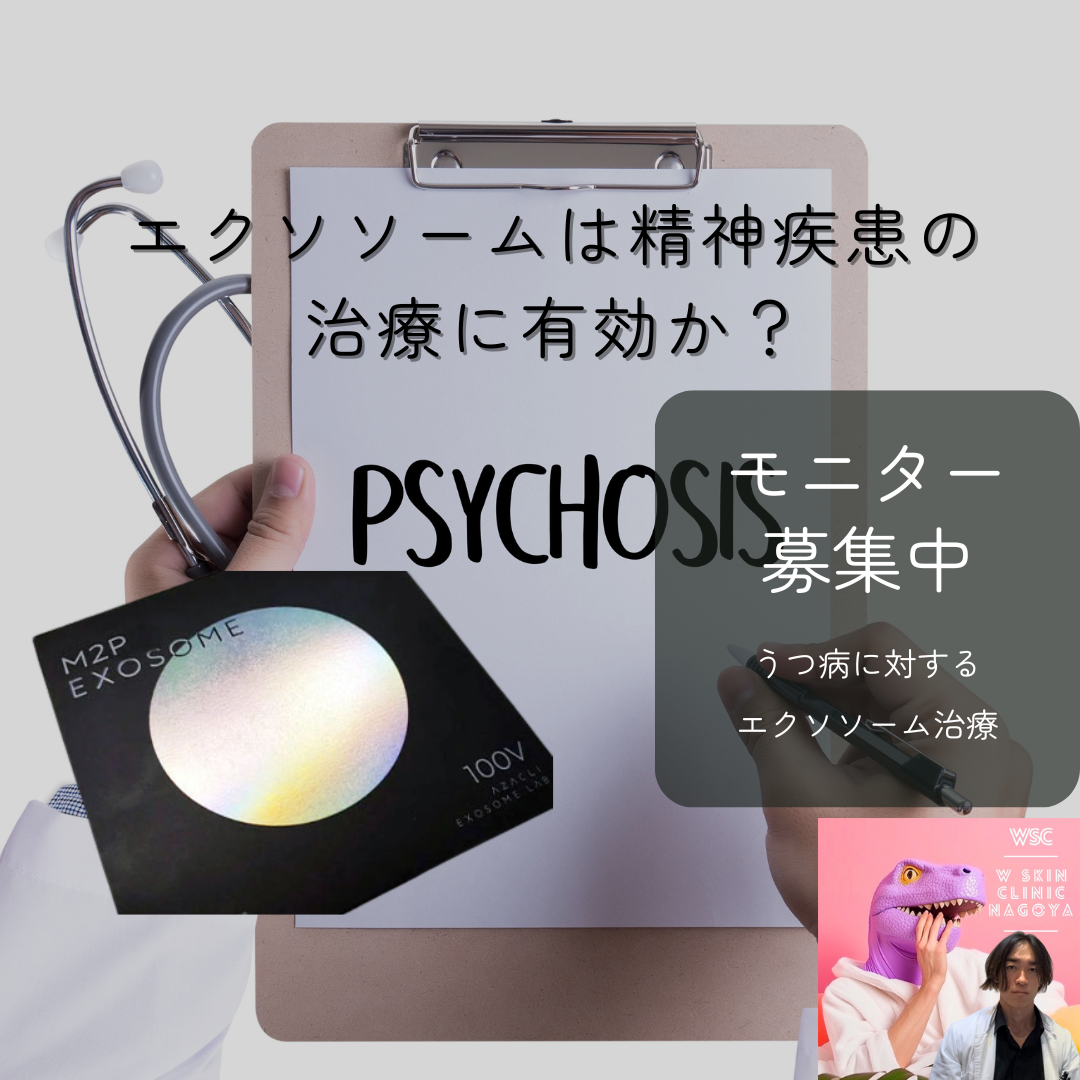NEWSお知らせ
2024.07.18|ブログ
エクソソームは精神疾患の治療に有効か?そのメカニズム、根拠について、名古屋の美容皮膚科医が解説

エクソソームは精神疾患の治療に有効か?そのメカニズム、根拠について、名古屋の美容皮膚科医が解説
こんにちは、Wスキンクリニック名古屋、院長の加藤晃司です。
今回は、エクソソームは精神疾患の治療に有効か?そのメカニズム、根拠について解説します。
エクソソームとは?
エクソソームは、細胞から分泌される小さな膜小胞で、細胞間の情報伝達を行う役割を持ちます。これらは、タンパク質、リポイド、RNAなどの生体分子を含み、様々な生理的・病理的プロセスに関与しています。
メカニズム
エクソソームが精神疾患の治療に有効であると考えられるメカニズムは以下の通りです:
神経細胞の保護と修復:
エクソソームは神経細胞の修復や保護に寄与する成分を含んでおり、脳内の神経ネットワークの再生を促進します。特に、損傷を受けた神経細胞の再生やシナプスの修復を助けることで、認知機能や精神状態の改善が期待されます。
抗炎症効果:
精神疾患の多くは脳内の慢性的な炎症と関連しています。エクソソームは抗炎症作用を持ち、炎症を抑制することで脳内の環境を改善し、症状の緩和に寄与します。
遺伝子発現の調節:
エクソソームに含まれるmicroRNAや他の非コードRNAは、遺伝子発現を調節する能力があり、これにより脳内の神経細胞の機能を調整し、精神疾患の病態改善を助けることができます。
神経伝達物質のバランス調整:
エクソソームは、神経伝達物質の代謝に関与する酵素や調節因子を運搬することができ、これにより脳内の神経伝達物質のバランスを調整し、精神状態の安定化に寄与します。
根拠
動物実験:
動物モデルを用いた研究では、エクソソームが神経保護効果や抗炎症効果を示し、精神疾患のモデルにおいて症状の改善が確認されています。例えば、ラットを用いたうつ病モデルや不安障害モデルにおいて、エクソソームの投与が行動改善や神経細胞の修復を促進したとの報告があります。
臨床研究:
現在、人間を対象とした臨床研究は初期段階にありますが、初期の試験ではエクソソームが安全に使用でき、精神疾患の症状改善に寄与する可能性が示されています。特に、脳卒中後のうつ病や認知症に対するエクソソーム療法の有効性が探られています。
基礎研究:
エクソソームの基礎研究により、その構成成分や作用メカニズムが詳細に解明されつつあります。これにより、エクソソームがどのように脳内で機能するのか、その分子レベルでの作用が明らかになりつつあります。
まとめ
エクソソームは、その多機能性と非侵襲的な特性から、精神疾患の治療において有望なツールとされています。神経細胞の保護・修復、抗炎症効果、遺伝子発現の調節、神経伝達物質のバランス調整といった多岐にわたるメカニズムを通じて、精神疾患の症状改善に寄与する可能性があります。現在のところ、動物実験や初期の臨床研究で有効性が示されており、今後のさらなる研究が期待されます。
当法人では、うつ病に対するエクソソームのモニター治療を行っています。
これまでの利用者の方のデータ解析し、論文として発表しています。
うつ症状は有意に改善しており、有効性を認めています。
今使っている精神科内服を減らしたい、やめたい、と考えている方、精神科薬を使わず治療したいと考えている方、には治療選択肢の一つとなるはずです。
ご興味のある方はクリニックまでお問い合わせください。
Wスキンクリニック名古屋でのエクソソーム治療はこちら
https://www.w-clinic-nagoya.com/acne/exosome
NMN点滴はこちら
https://www.w-clinic-nagoya.com/beauty-drip/nmn
高濃度ビタミンC点滴はこちら
https://www.w-clinic-nagoya.com/beauty-drip/vitamin-c
*当院では
NMNは一般社団法人NMN医療研究会、エクソソームはセルソース株式会社のM2P-エクソソームを使用しています。
Wスキンクリニック名古屋
理事長 加藤晃司
当院では無料でスタッフカウンセリングを行なっております。
お気軽にご予約くださいませ
Wスキンクリニック名古屋 (美容皮膚科)
https://www.w-clinic-nagoya.com/
〒461-0005 愛知県名古屋市東区東桜 2-4-1 第3コジマビル6F
TEL 052-7377-7117(10:00~19:00)
LINE ID @w.nagoya
高岳駅より徒歩4分 / 新栄町駅より徒歩5分
お車でお越しの方
名鉄協商パーキングチケットをお渡しいたしますので、クリニック近くのパーキングをご利用ください。
Are Exosomes Effective for Treating Mental Illness? Mechanisms and Evidence Explained by a Psychiatrist in Nagoya
Hello, I’m Dr. Koji Kato, Director of W Skin Clinic Nagoya.
Today, I will explain whether exosomes are effective in treating mental illnesses, including their mechanisms and supporting evidence.
What Are Exosomes?
Exosomes are small membrane-bound vesicles secreted by cells that facilitate intercellular communication. They contain proteins, lipids, and RNA, and play a role in various physiological and pathological processes.
Mechanisms
Exosomes are thought to be effective in treating mental illnesses through the following mechanisms:
- Protection and Repair of Neurons
Exosomes contain components that contribute to the repair and protection of neurons. They promote the regeneration of neural networks in the brain, which can help improve cognitive functions and mental states, especially by aiding the repair of damaged neurons and synapses.
- Anti-inflammatory Effects
Many mental illnesses are associated with chronic inflammation in the brain. Exosomes have anti-inflammatory properties that help reduce inflammation, thereby improving the brain’s environment and alleviating symptoms.
- Regulation of Gene Expression
Exosomes contain microRNAs and other non-coding RNAs that can regulate gene expression. This ability helps adjust the function of neurons in the brain, contributing to the improvement of mental illness conditions.
- Balancing Neurotransmitters
Exosomes can carry enzymes and regulatory factors involved in the metabolism of neurotransmitters, helping to balance neurotransmitter levels in the brain, which contributes to stabilizing mental states.
Evidence
Animal Studies
Studies using animal models have shown that exosomes exhibit neuroprotective and anti-inflammatory effects, leading to symptom improvement in models of mental illness. For example, in depression and anxiety models using rats, exosome administration has been reported to improve behavior and promote neuronal repair.
Clinical Research
While human clinical research is still in its early stages, initial trials suggest that exosomes can be safely used and may help improve symptoms of mental illnesses. Exosome therapy's effectiveness is being explored particularly for conditions such as post-stroke depression and dementia.
Basic Research
Basic research on exosomes has been detailing their constituent components and mechanisms of action. This research is clarifying how exosomes function within the brain at a molecular level, revealing their potential impact on brain health.
Summary
Exosomes are considered promising tools for treating mental illnesses due to their multifunctional and non-invasive properties. Their mechanisms—protection and repair of neurons, anti-inflammatory effects, regulation of gene expression, and balancing neurotransmitters—suggest they could significantly improve mental illness symptoms. Current animal studies and preliminary clinical trials support their efficacy, with further research anticipated.
At our clinic, we are conducting monitored exosome treatments for depression.
Data analysis from our users has shown significant improvement in depressive symptoms, confirming the treatment's effectiveness.
If you are interested in reducing or stopping your psychiatric medications, or seeking treatments without psychiatric drugs, exosome therapy might be an option for you.
Please contact our clinic for more information.




